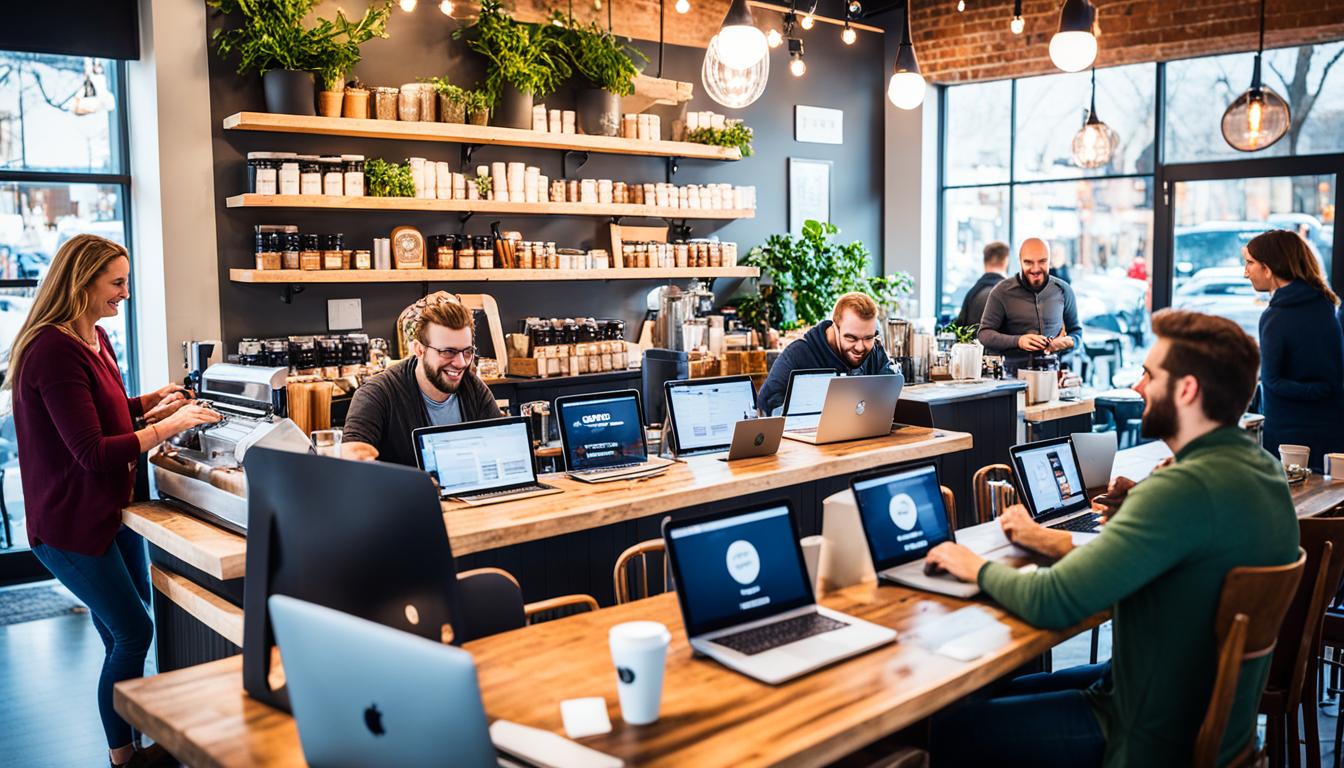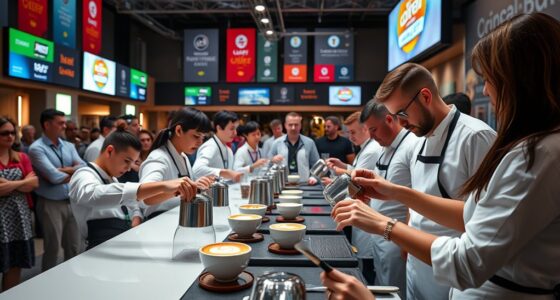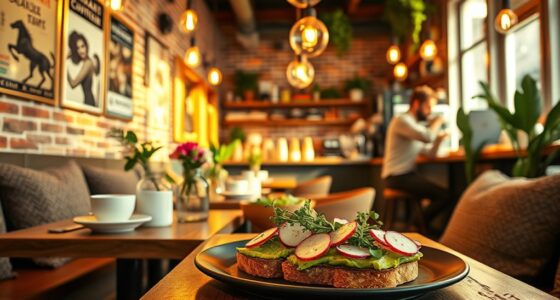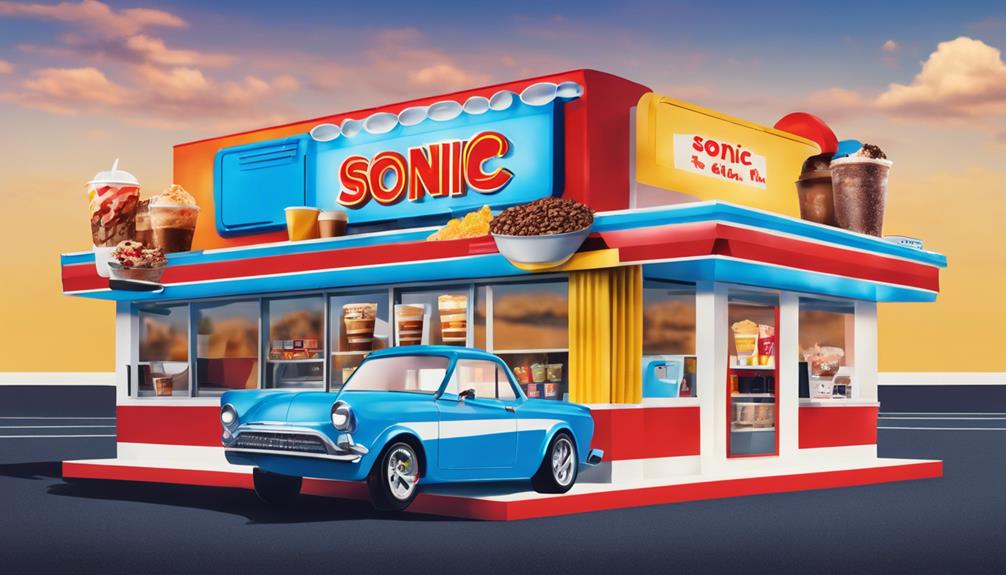In New York City, discovering a café that provides the ideal mix of a conducive work environment and comfort can significantly boost productivity. The city is home to a diverse selection of cafes and coffee shops designed for the modern professional, with free wifi and cozy seating. This guide showcases the top coffee shops in the city for a productive and pleasant work atmosphere, offering a welcoming ambiance, dependable Wi-Fi, and excellent coffee.
Have you ever wondered where you can find the best coffee shops in NYC to fuel your productive work sessions? Or are you tired of fighting for a table in overcrowded cafes that lack the ambiance and amenities necessary for a focused work environment?
Look no further! We have researched and compiled a list of the top coffee shops in New York City that not only provide exceptional brews but also offer an ideal setting for a productive work session. Whether you are a freelance writer, a student working on assignments, or a professional in need of a change of scenery, these coffee shops have got you covered.
Key Takeaways:
- NYC offers a diverse selection of coffee shops that cater to the needs of the modern professional.
- These coffee shops provide a perfect balance of cozy ambiance, reliable Wi-Fi, and exceptional brews for a productive work session.
- Devoción, Felix Roasting Co., Ground Central Coffee Company, Kobrick Coffee, Gregorys Coffee, Amano Cafe, and Think Coffee are among the top coffee shops in NYC for productive work sessions.
- Each coffee shop has its unique atmosphere and amenities that make it stand out from the rest.
- Whether you prefer a Colombian-inspired ambiance, a vintage setting, a literary charm, or an eco-conscious experience, there is a coffee shop in NYC that suits your taste and work style.
Devoción
When it comes to finding the best coffee shop in NYC, Devoción is a top contender. This Colombian-inspired cafe brings a taste of the vibrant coffee culture of Colombia to the bustling streets of New York City. Known for its commitment to sourcing farm-fresh coffee directly from producers in Colombia, Devoción delivers a truly authentic and flavorful experience.
With several locations scattered throughout the city, Devoción offers convenience and accessibility for coffee enthusiasts and professionals looking for a productive work session. From its flagship store in Flatiron to its Midtown and multiple Brooklyn outposts, Devoción’s warm and fresh atmosphere provides an inviting space to focus and get things done.
Step into any Devoción location, and you’ll be greeted with the rich aroma of freshly brewed Colombian coffee. The cozy and stylish interiors make for an ideal work environment, whether you prefer a quiet nook or a bustling atmosphere. Devoción’s commitment to quality extends beyond its coffee beans; their baristas are skilled in the art of crafting the perfect cup, ensuring each sip is a delight.
Devoción brings a taste of Colombia’s coffee heritage to the heart of NYC, making it the go-to coffee shop for professionals seeking a stimulating and productive work session.
In addition to its exceptional coffee, Devoción offers a carefully curated food menu featuring local and organic ingredients. From delectable pastries to nourishing breakfast options, the menu complements the coffee perfectly and provides a satisfying break for a quick bite.
Devoción Locations in NYC:
- Flatiron
- Midtown
- Brooklyn – Multiple Outposts
If you’re searching for the best coffee shop in NYC that combines an authentic Colombian coffee experience with a welcoming and productive atmosphere, Devoción is the place to be. So grab your laptop, settle in at one of their locations, and let the aroma of freshly brewed coffee fuel your productivity.
Felix Roasting Co.
Inspired by the late-19th-century aesthetic movement in Britain, Felix Roasting Co. takes you on a journey back in time with its carefully curated ambiance. Step into this coffee shop and be transported to another era, where every detail is designed to create an immersive experience.
With multiple locations in NoHo, Hudson Square, and a flagship in NoMad, Felix Roasting Co. is a must-visit destination for coffee enthusiasts and those in search of a productive work session in NYC. Each cafe offers a unique atmosphere that blends vintage charm with modern comfort.
Find your favorite spot in the cozy seating area, surrounded by the beautifully crafted decor that reflects the aesthetic movement’s emphasis on art and craftsmanship. The ambiance at Felix Roasting Co. is designed to inspire creativity and provide a serene setting for focused work.
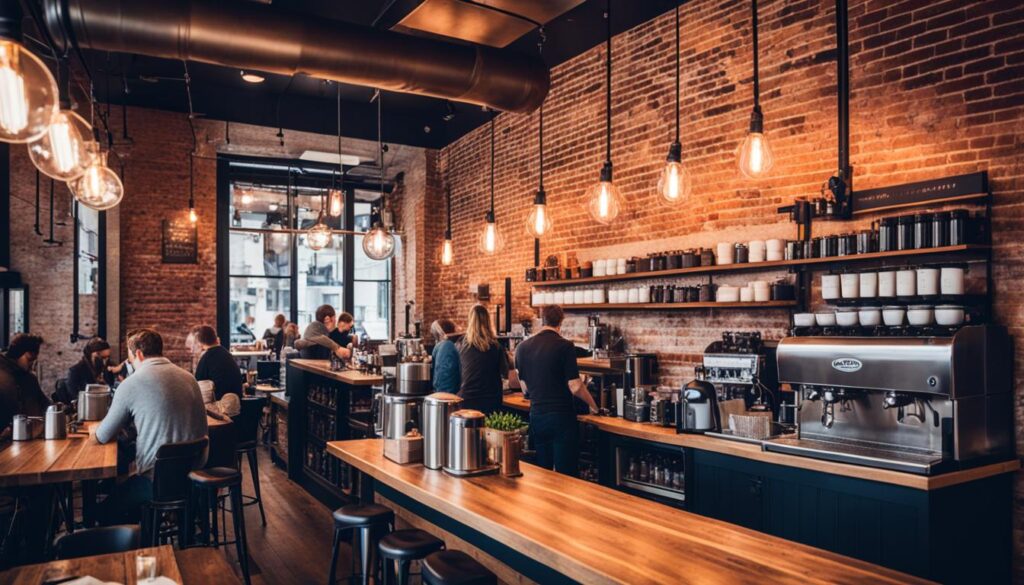
Indulge in their meticulously crafted coffee selection, made from beans sourced from around the world. Whether you prefer a classic espresso or a specialty brew, Felix Roasting Co. delivers a rich and satisfying coffee experience.
If you need a break from work, take a moment to explore the artful displays and unique design elements that adorn each location. The attention to detail and commitment to creating an immersive environment make Felix Roasting Co. one of the best coffee shops in NoHo NYC.
“Felix Roasting Co. captures the essence of an era gone by, offering a unique and memorable coffee experience in the heart of NYC. The carefully curated ambiance and exceptional brews make it an ideal spot for productive work sessions or simply enjoying a moment of tranquility.”
Ground Central Coffee Company
If you’re searching for a coffee shop that combines literary charm with a cozy ambiance, look no further than Ground Central Coffee Company. With multiple locations scattered throughout the city, this coffee shop is a standout destination for coffee connoisseurs and those seeking an escape from the hustle and bustle of NYC.
Step into Ground Central Coffee Company, and you’ll be greeted by extensive book displays, creating an inviting and intellectual atmosphere. The exposed brick walls add a touch of rustic charm, while the range of seating options ensures there’s a spot to suit every preference. Whether you prefer a cozy corner tucked away with a good book or a communal table for collaborative work sessions, Ground Central Coffee Company has you covered.
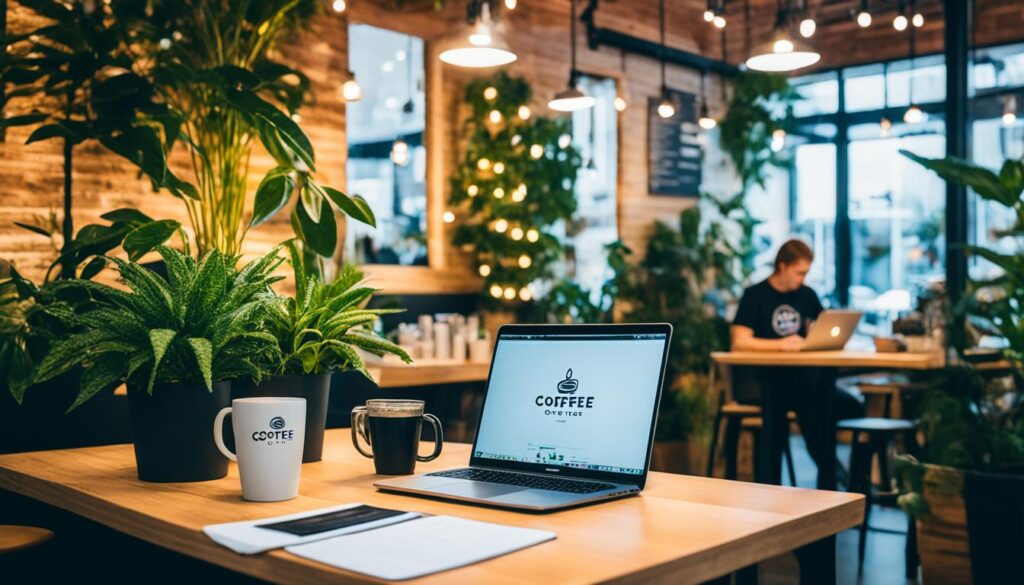
One of the highlights of Ground Central Coffee Company is its commitment to quality coffee. The baristas expertly craft brews using ethically sourced beans, ensuring a rich and flavorful experience with every sip. Whether you’re a fan of a classic espresso or prefer to indulge in a specialty latte, Ground Central Coffee Company has a wide selection to satisfy any coffee lover’s palate.
Ground Central Coffee Company provides a welcoming and comfortable environment for productive work sessions. The combination of literary charm, cozy ambiance, and top-notch brews makes it one of the best coffee shops in NYC.”
When it comes to convenience, Ground Central Coffee Company has you covered. With multiple locations throughout the city, including their Hell’s Kitchen cafe and the Garment District spot, you’ll never be far from this coffee lover’s haven. Whether you’re looking for a quick caffeine fix or a place to settle in for a few hours of work, Ground Central Coffee Company has the perfect location for you.
Ground Central Coffee Company Locations:
| Location | Address | Opening Hours |
|---|---|---|
| Hell’s Kitchen | 888 10th Ave, New York, NY 10019 | Monday-Sunday: 7am-7pm |
| Garment District | 155 E 44th St, New York, NY 10017 | Monday-Friday: 7am-7pm, Saturday-Sunday: 8am-5pm |
Whether you’re in search of a cozy spot to work or simply looking to enjoy a quality cup of coffee, Ground Central Coffee Company is a must-visit destination. The literary charm, cozy ambiance, and exceptional brews make it one of the best coffee shops in NYC. Find the nearest location and experience the magic for yourself.
Kobrick Coffee
Established in 1920, Kobrick Coffee is a renowned coffee shop in New York City that offers a delightful vintage atmosphere. With its exposed brick walls, warm lighting, and subtle plant decorations, Kobrick Coffee creates a cozy and inviting ambiance for patrons.
At Kobrick Coffee, you’ll find a haven for productive work sessions. The cafe’s open hours from 7 am to 2 am provide you with ample time to settle in and focus on your tasks. Whether you need a quiet space to write or a stimulating environment to brainstorm, Kobrick Coffee offers the perfect backdrop.
Not only does Kobrick Coffee provide a conducive setting for work, but it also offers a delectable selection of pastries and specialty drinks to keep you fueled throughout the day. Take a break from your work and indulge in their espresso martini or savor a scrumptious pastry while you recharge.
“Kobrick Coffee is a hidden gem in the heart of NYC. The vintage ambiance and delicious brews make it one of the best coffee shops in town for both work and relaxation.” – Local coffee enthusiast
With its convenient location, Kobrick Coffee is easily accessible for locals and visitors alike. So whether you’re a freelancer looking for a cozy work spot or a traveler exploring the bustling city, Kobrick Coffee should be on your list of the best coffee shops in NYC to experience.
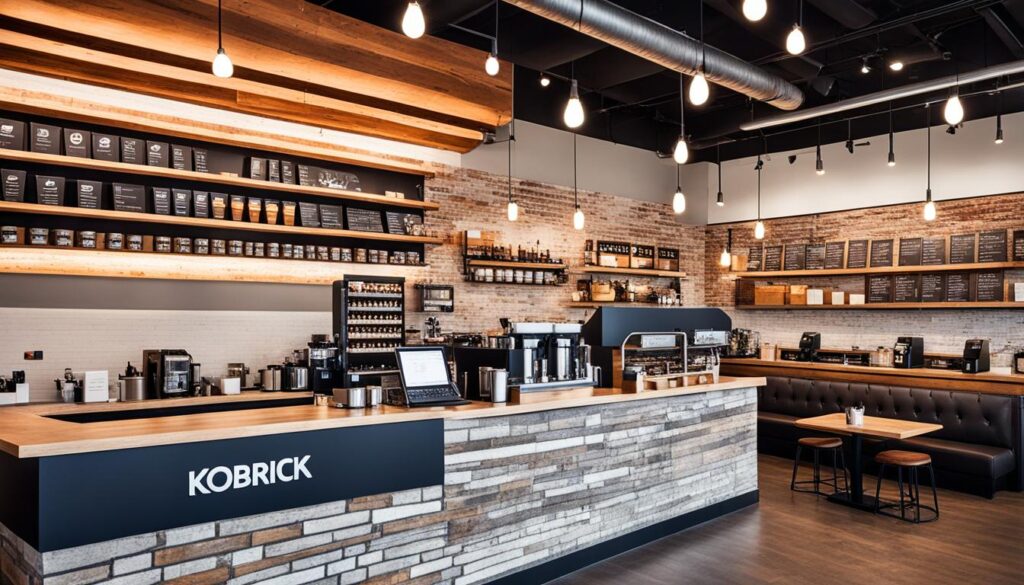
Overall, Kobrick Coffee’s blend of vintage charm, productive atmosphere, and delightful treats make it a top choice for coffee enthusiasts seeking an exceptional experience in the heart of New York City.
Gregorys Coffee
When it comes to finding the best coffee shops in NYC for a productive work session, Gregorys Coffee is a top contender. As a beloved NYC chain, Gregorys Coffee offers a diverse variety of coffee selections and all-day breakfast sandwiches to cater to your taste buds and keep you fueled throughout the day.
With numerous locations throughout the city, you’ll never be far from a Gregorys Coffee shop. However, one branch that truly stands out among the rest is the Gregorys Coffee NoHo branch. Situated in the vibrant neighborhood of NoHo, this branch offers a fresh and inviting atmosphere that is perfect for getting work done.
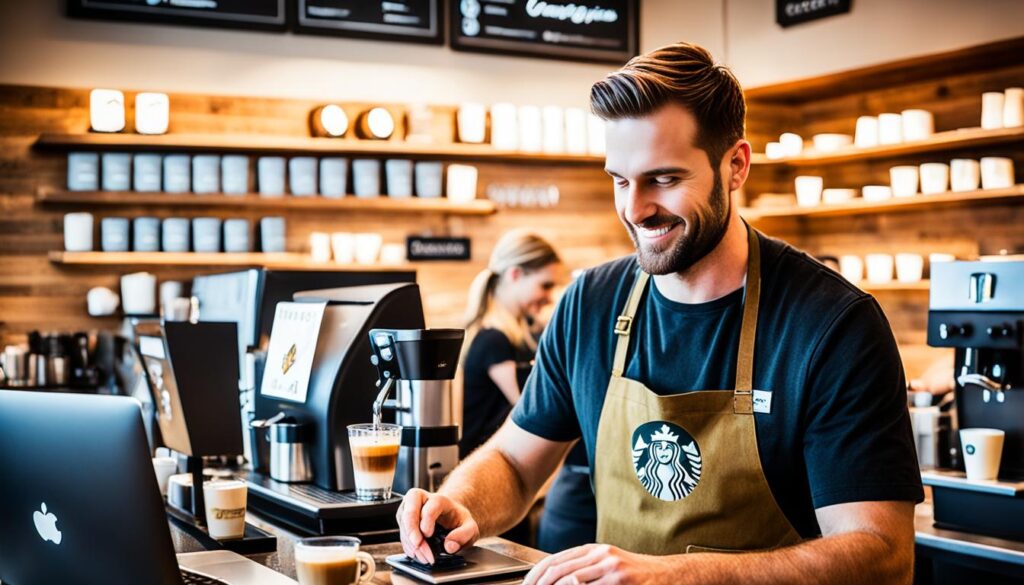
This particular Gregorys Coffee branch is adorned with lush plant displays and bright lights, creating a refreshing ambiance that inspires creativity and productivity. Whether you prefer to work at a cozy corner table or need a spacious communal area to collaborate with colleagues, the NoHo branch has a variety of seating options to accommodate your needs.
Aside from the inviting atmosphere, Gregorys Coffee is also known for its exceptional coffee. From classic drip brews to specialty espresso-based drinks, their extensive coffee menu ensures there’s a perfect cup for every coffee lover. And if you need something to munch on while you work, their all-day breakfast sandwiches are a delicious option.
“The atmosphere at Gregorys Coffee NoHo is so refreshing. I feel inspired and focused whenever I work here.” – Sarah, local freelancer
Whether you’re a local freelancer, a student, or a professional looking for a productive work spot, Gregorys Coffee NoHo provides the ideal setting to fuel your mind and enjoy a great cup of coffee.
Suggested Gregorys Coffee Menu Items:
- Signature Black Coffee
- Cold Brew
- Matcha Latte
- Avocado Toast
- Sausage, Egg, and Cheese on a Biscuit
| Location | Address | Opening Hours |
|---|---|---|
| Gregorys Coffee NoHo | 123 NoHo Street, New York, NY 10001 | Mon-Fri: 7am-7pm Sat-Sun: 8am-5pm |
| Gregorys Coffee Midtown | 456 Midtown Avenue, New York, NY 10002 | Mon-Fri: 7am-8pm Sat-Sun: 9am-6pm |
| Gregorys Coffee Brooklyn | 789 Brooklyn Street, Brooklyn, NY 11201 | Mon-Fri: 6:30am-6pm Sat-Sun: 8am-5pm |
Amano Cafe
Located in the vibrant West Village neighborhood of NYC, Amano Cafe is a must-visit destination for coffee lovers and professionals seeking a productive work session. With its dedication to sourcing hand-picked beans directly from farmers in Latin America, Amano Cafe offers a genuine and authentic coffee experience that is second to none.
The West Village location of Amano Cafe is known for its stunning floor-to-ceiling windows, which flood the space with natural light, creating a refreshing and inviting atmosphere. This abundance of natural light not only enhances the aesthetic appeal of the cafe but also contributes to a productive work environment, keeping you energized and focused throughout your session.
Amano Cafe isn’t just about great coffee and a beautiful setting; it also provides all the amenities you need for a successful work session. Complimentary Wi-Fi ensures you stay connected, while comfortable seating options allow you to set up your workspace just the way you like it. Whether you prefer a cozy nook or a table by the window, Amano Cafe offers a variety of seating arrangements to suit your preferences.
So, grab your laptop, order your favorite brew from their extensive menu of coffees and specialty drinks, and settle in for a productive work session at Amano Cafe. Whether you’re working on an important project, studying, or simply need a change of scenery, this coffee shop is the perfect spot to fuel your productivity and creativity.
Don’t miss out on the opportunity to experience the best of NYC’s coffee scene. Visit Amano Cafe’s West Village location and discover why it’s regarded as one of the best coffee shops in the city.
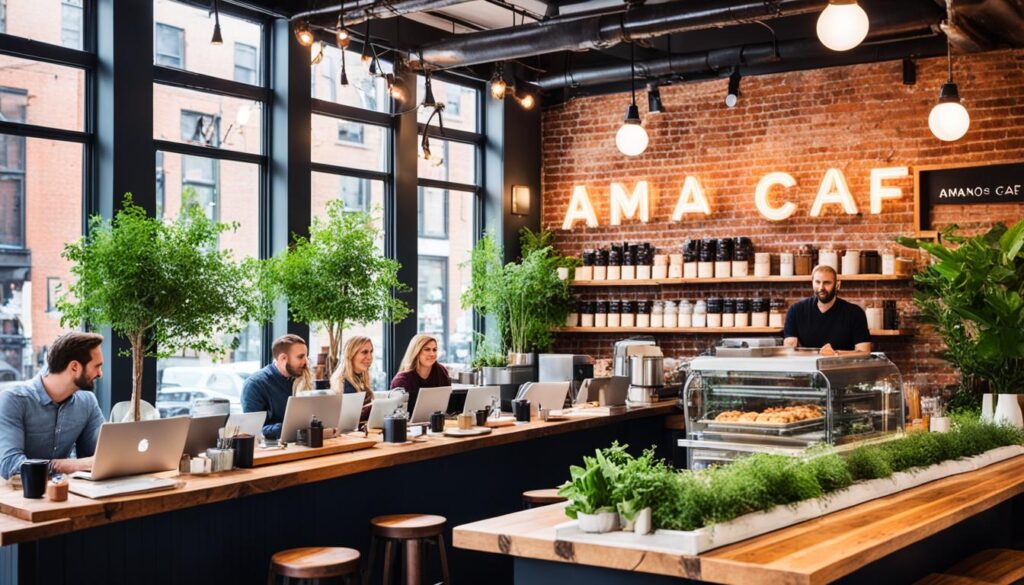
Experience the perfect blend of great coffee, a vibrant atmosphere, and productivity at Amano Cafe in New York City.
Think Coffee
Think Coffee is a renowned coffee shop in NYC, known for its commitment to sustainability and ethically sourced coffee. If you’re looking for one of the best coffee shops in the city, Think Coffee should be at the top of your list.
Located in the vibrant neighborhood of Tribeca, Think Coffee offers a comfortable and inviting atmosphere for both work and relaxation. The spacious interior provides ample seating options, making it an ideal spot for settling in for an all-day work session or catching up with friends over a cup of coffee.
One of the standout features of Think Coffee’s Tribeca location is the abundance of natural light that floods the space through large windows. The bright and airy environment enhances productivity and creates a pleasant ambiance for a focused work session.
But Think Coffee is not just about the ambiance. Their commitment to sustainability is truly commendable. They prioritize ethically sourced coffee beans, ensuring that each cup you enjoy comes from farmers who are treated fairly and paid a fair price for their hard work.
Whether you’re looking for a cozy spot to work, a place to meet up with friends, or a quick caffeine fix between meetings, Think Coffee’s Tribeca location has got you covered. Their blend of sustainability and quality has made them a go-to choice for coffee lovers and eco-conscious individuals alike.
“Think Coffee is the perfect combination of a great work environment, delicious coffee, and a commitment to sustainability. I always enjoy spending time here, whether I’m working on a project or simply enjoying a cup of coffee.”
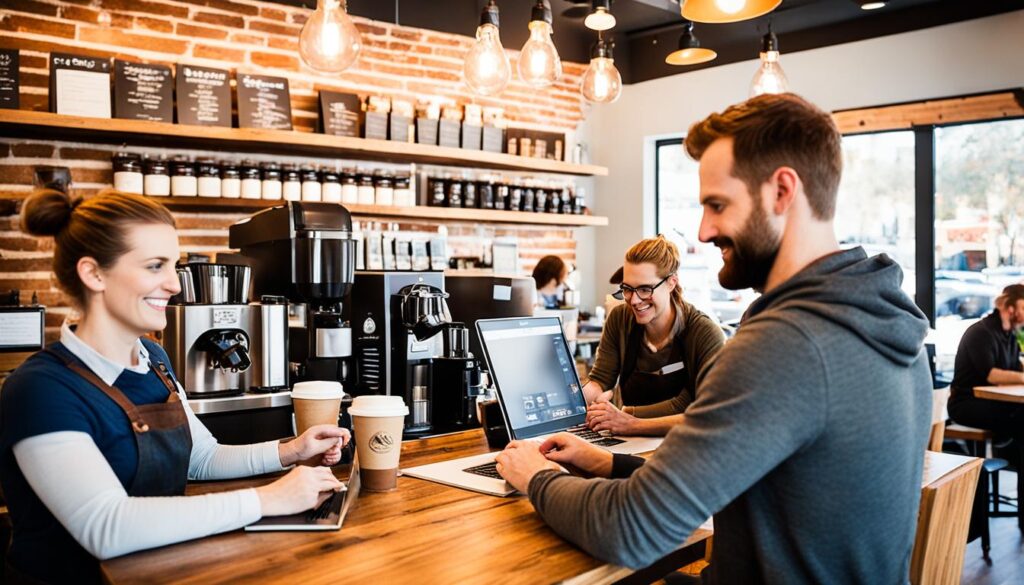
Experience the best of NYC’s coffee scene at Think Coffee’s Tribeca location. With its sustainability focus, cozy atmosphere, and prime location, this coffee shop is a must-visit for anyone seeking a productive and enjoyable coffee experience.
Conclusion
When it comes to finding coffee shops for work in NYC, you’re in luck. The city offers a plethora of options that cater to the needs of productive individuals like yourself. Whether you’re seeking a cozy ambiance, reliable Wi-Fi, or exceptional brews, the best coffee shops in NYC have got you covered.
Devoción stands out with its Colombian-inspired atmosphere, while Felix Roasting Co. captivates visitors with its immersive experience. Ground Central Coffee Company offers a literary charm that is hard to resist, and Kobrick Coffee takes you back in time with its vintage vibe. Gregorys Coffee provides a diverse menu of coffee and breakfast options, and Amano Cafe offers a refreshing setting with floor-to-ceiling windows. Finally, Think Coffee combines sustainability with quality for an eco-conscious work session.
So whether you’re looking for a quiet corner to write or a vibrant hub to collaborate, these coffee shops will cater to your productivity needs. With their unique blend of ambiance, amenities, and exceptional brews, you can enjoy a productive and enjoyable work session right in the heart of NYC.
